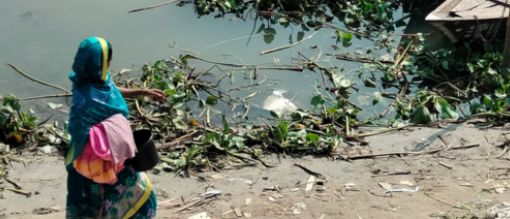As the Summit for a New Global Financial Pact took place in Paris on 22nd to 23rd June, Minister for Climate Change and Energy Chris Bowen released a call urging strong reform of Multilateral Development Bank (MDB) financing in addressing the climate crisis, alongside his Canadian and New Zealander counterparts.
The statement specifically calls for action to support nations suffering climate impacts, emphasising the need for MDBs to increase their action and financing to align with the Paris Climate Agreement commitments.
It comes as the world’s leading climate scientists – the Intergovernmental Panel on Climate Change – warn that to maintain even a 50% chance of keeping global warming within 1.5C emissions must peak by 2025 and then dramatically reduce.
While MDBs can play an important role in climate financing, they have also received persistent criticism over their financing to oil and gas projects amidst a climate crisis that is a leading driver of poverty. A core aspect of the funding for MDBs - including the Asian Development Bank (ADB), Asian Infrastructure and Investment Bank (AIIB) and the World Bank - often comes out of government aid budgets. This results in taxpayer aid money propping up fossil fuels in countries where renewable energy is already the cheapest energy option.
“Minister Bowen’s statement pointed to what MDBs could do but sidestepped the concrete action that Australia could take today to put words into action,” said Jubilee Australia Climate and Environmental Justice Director Shona Hawkes, “this includes stopping our aid budget from being used to prop up fossil fuels projects overseas.”
“Continued use of fossil fuels is driving poverty and inequality, and impacting already marginalised communities the most, like women in the Global South. Australia has an opportunity to demonstrate international climate leadership. We can use our influence with multilateral development banks to ensure that public money doesn’t further fuel the climate crisis, but instead supports communities to respond and adapt,” said Katherine Tu, ActionAid Australia Head of Campaigns and Policy.
Figures for 2016-2020 show that of the federal aid budget annually nearly 19% of our federal aid budget annually went to MDBs - AU$713.83 million. However, in 2016-2021 three of MDBs, the World Bank, ADB and AIIB, financed fossil projects to the tune of up to AU$ 32.85 billion. Australia’s share of this contribution is an estimated AU$828 million. Citizens and civil society organisations have often strongly opposed these projects – due to their impacts on local communities and environmental harm. Australia is a sizable shareholder in the ADB (5th largest) and the AIIB (6th largest). It’s also in the largest 20 shareholders of the World Bank (18th).
Recently, MDBs such as the World Bank and ADB have released a flurry of new commitments that will kick in on 1st July and make claim to be aligned with the Paris agreement. While these respond to growing calls for change - they fail to align with the scientific evidence of what action is needed to meet 1.5 and true Paris alignment. Civil society experts have been highly critical that these MDB policies allow ongoing financing of oil and gas, and even some loopholes on coal. They contravene both the scientific evidence on the need to dramatically phase out fossil fuels, as well as core advice from the International Energy Agency.
Almost 40 governments – including New Zealand, the UK, Germany and Fiji – have committed to end the use of their export credit for fossil fuels by signing onto the Glasgow Statement, commitments that typically extend to aid financing as well. Australia could choose to write voting guidance for its officials contributing to MDB decision-making – calling for them to vote against the use of MDB money for fossil fuels. While this doesn’t prevent governments from seeking funds from elsewhere – it ensures that aid money isn’t used to subsidise and de-risk fossil fuels projects which, through driving emissions, are driving increased humanitarian crises. The US has already issued voting guidance.
The call of the three climate change ministers mentions that ‘no single government can address this alone. Together, we can rise to the challenge’. While more financing for addressing the impacts of climate change is vital – it's also critical that this collective response extends to calling for MDBs to stop supporting fossil fuels that drive further crises.
MDBs cannot achieve this pathway if their shareholders in governments don’t take action to implement this change. Jubilee Australia and ActionAid Australia have identified three key steps Australia must take to align government action with Minister Bowen’s vision:
-
Action 1: Sign and implement the Statement on International Public Support for the Clean Energy Transition (Glasgow Statement) as outlined in a recent civil society open letter
-
Action 2: Develop MDB Engagement Framework and publish fossil fuel voting guidance for stopping fossil fuels investment. The US government has already published their voting guidance for MDBs to achieve this outcome.
-
Action 3: Issue a national policy that prohibits public financing for fossil fuels through the aid program. The UK government released their national policy guidance on fossil fuel energy sector development to achieve this outcome.
We welcome Minister Bowen’s call for reform but the Albanese government must pull the policy levers at its disposal to shift public financing out of fossil fuels. If we are to avoid the catastrophic impacts of the climate crisis the time for action must be now.
Image attribution © CLEAN (Coastal Livelihood and Environmental Action Network)
A woman walks along the bank of the Meghna River. The Unique Meghnaghat Power Plant is situated on the right bank of the Meghna River. These are the direct human impacts of MDB financing of fossil fuels.
